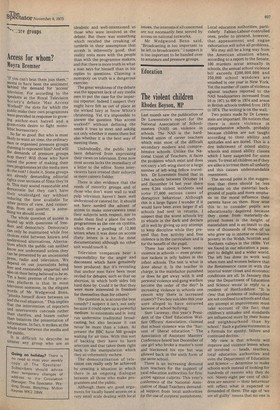'Are groups
Access for whom?
Moyra Bremner _
"If you can't beat them join them”seems to have been the sentiment behind the demand for 'access'
television. For according to the Speakers at the Royal Television Society's debate 'Has Access Worked?' the slots for which the Public make their own programmes were provided in response to grow ing anchor-man hatred and a grass-roots desire to fight monolithic bureaucracy. ' So far so good. But who is most likely to want air time, the ordinary
Man or organised pressure groups Claiming to represent him? And will the demands of pressure groups stop there? Will those who have tasted the power of making their own programmes let the media men do the rest? I doubt it. Some groups are already demanding editorial rights over sections of films they're lfl. This may sound reasonable and democratic but they can't have their unabridged say without reducing the time available for other points of view. And censor
Ship, from any quarter, is something we should avoid.
The whole question of access is bound up with questions of freedom and democracy. Democracy can only be maintained while free Choices exist between known and understood alternatives, Alternatives which the public can neither know nor understand unless they can be presented by an uncensored Press, radio and television. We depend on our journalists being free and reasonably impartial and also on their being believed to be so. Yet a basic premise of the pro-access platform is that in most television someone, in the elegant Words of Mr Wedgwood Benn, 'Plonks himself down between us and the real situation." This implies that the intervention of reporters and interviewers conceals rather than clarifies, and biases rather than balm-ices the presentation of information. In fact, it strikes at the Whole trust between the media and the public.
It is difficult to describe as sinister any group who are as idealistic and well-intentioned as those who were involved in the debate. But there was something which recalled the creaking of tumbrils in their assumption that acces's is inherently good, that reality rests more with the people than with the programme makers, and that there is more truth in what a man says for himself than in his replies to questions. Claiming a monopoly on truth is a dangerous exercise.
The great weakness of the debate was the apparent lack of any media men to put the case for the impartial reporter. Indeed I suspect they might have felt as out of place as the wicked fairy at Snow White's christening. Yet it's impossible to answer the question 'Has access worked?' without defining the needs it tries to meet and asking not only whether it meets them but also whether it is the best way of meeting them.
Undoubtedly, the public have been debarred from expressing their views on television. Even now most access lacks the immediacy of a letter to the editor. Some interviewers have treated their subjects as mere camera fodder.
There is also evidence that the needs of minority groups and of those who don't want wall to wall pulp television haven't been well understood or catered for. It should not have needed the advent of access to make interviewers treat their subjects with respect, nor to make them find a place for such programmes as the one on cystitis, which drew a postbag of 12,000 letters when it was done on access ,(forty letters is a lot for most documentaries) although no other unit would touch it.
Television companies bear a responsibility for the anger and discontent which have genuinely been produced. But it's revealing that anchor men have been most reviled for deba,tes, such as that on abortion, in which both sides felt hard done by. Could it be that they were more interested in freedom for themselves than for others?
The question is, is access the best remedy? I suspect it isn't, not only because it could open up a powerful medium to extremists and in long run undermine traditional broadcasting, but also because it can never be more than a token. At present the BBC have 500 groups waiting for air time. With this sort of backlog they have to have selection and that takes them right back to the manipulation which they so vehemently eschew.
The democratisation of television can really only be achieved by creating a situation in which there is an ongoing dialogue between all those who make programmes and the public.
Although there are good arguments for locally based access on a very small scale dealing with local
issues, the interests of all concerned are not necessarily best served by access on national networks.
Mr Wedgwood Bern said, "Broadcasting is too important to be left to broadcasters." I suspect it is too important to be handed over to amateurs and pressure groups.
































 Previous page
Previous page